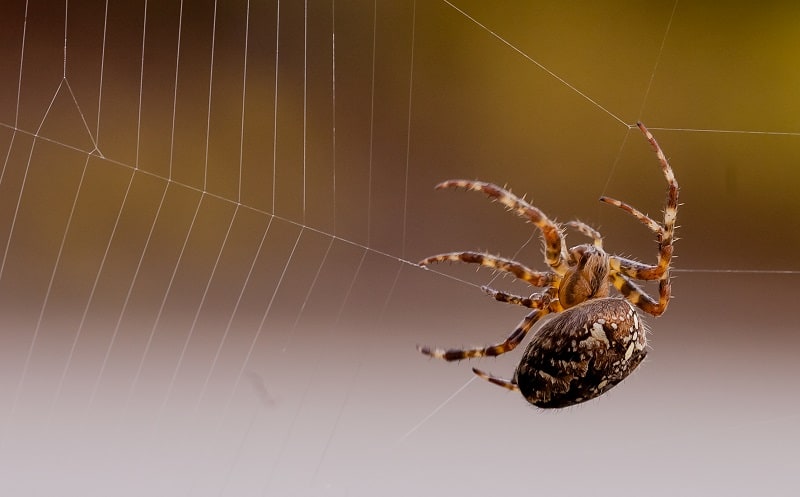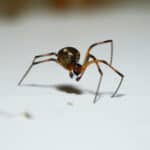Most living creatures produce some sound in response to fear or excitement, among other emotions. Insects too fall under this category, even though the assumption is that their noise is inaudible to human beings, but is this always the case?
Spiders do not scream since most cannot produce noise with their mouths. However, like other living things, they need to communicate and will use other body parts to make sounds. Some of the spiders that can do this include the barking spiders, the wolf spider, and the bird-eating spiders.
If you want to know whether spiders scream, this is the guide for you. We will help you understand whether spiders scream, whether they can make noise, and if they can hear you. Read through the subsections to find out all the answers you need.

Do Spiders Scream?
It is a common impulse for individuals with arachnophobia to scream when they spot a spider. If you are among these individuals and wondering whether this reaction is mutual, then we have the answers for you.
A spider will not scream out of fear or pain since it does not have vocal cords. However, like crickets and grasshoppers, it will make noise by rubbing certain parts of its body. A technique called stridulation. This sound will be more or less like hissing but softer and more subtle. The sound will also differ from one spider to another, with some making a low hiss sound, which may be difficult to hear, while others make a purring sound, almost sounding like a click.
A spider will stridulate when angry, among other causes. Thus, if you keep a pet spider, you should avoid provoking it until it starts stridulating. Besides upsetting the spider, stridulation, if it happens often, will cause long-term health effects to your spider. This behavior may also threaten a less experienced keeper if not put under control.
Can Spiders Make Noise?
Noise is one of the ways living creatures communicate with each other. Therefore, continue reading to understand whether spiders can make noise or not and how they talk to each other.
While spiders do not scream, they can make a hissing sound while others make a purring sound. They do this despite lacking vocal cords. The purring sound is usually an invitation to their mates to locate them. The male spiders position themselves on surfaces such as leaves which vibrate easily and use their pedipalps to produce the vibrations. This sound is usually loud enough for human beings to hear.
Spiders such as giant tarantulas are noisy arachnids and will make noise when threatened or disturbed. To make this noise, they will use rub their two front legs and pedipalps. It is believed that the front legs are involved since the pedipalps are on the head. They make this noise to combat and overwhelm the threat in their environment. The duration and speed of this rubbing will vary depending on the spider species.
As mentioned above, one of the reasons a spider will make noise is to scare its threat. Another reason they would do this is to attract a mate. For instance, to impress the female spider, the male jumping spiders will do a dance routine and a song. The song will result from vibrations emanating from rubbing their thorax and abdomen.
During mating, female spiders produce some low-frequency noise. The female spider will sound like squeaky leather, and this sound is in response to the squeezing of the male genitalia during mating. This behavior is common with the short-bodied cellar spider. Males that produce this sound have higher chances of their sperm being selected by the female; hence, more offspring. Also, according to researchers, the female spiders will favor males with the most rhythmic genitalia movement. If the male squeezes the female forcefully, it may damage her. Thus, if the male persists or squeezes too hard, the female squeaks to alert him to take it easy.
Human beings will naturally not hear most of these vibrations. However, researchers use laser vibrometers to turn the vibrations into sounds humans can hear. This way, it becomes easy to study these sounds closely.
Despite not having vocal cords, spiders, like other creatures, can communicate with each other. To do this, they will use different levels of vibrations, also called seismic communication. They usually do this during mating and to warn their rivals and predators. Lastly, while spiders can hiss and purr, not every spider can hiss. The tarantula and wolf spiders are the most common hissing spiders. The tarantula produces a hissing sound while the wolf spider produces a purring noise.
Can Spiders Hear?
Since spiders make noises, you may be wondering whether they can hear each other and interpret the communications. You may also want to know whether they can hear you from across the room when you are approaching.
Spiders do not have ears, which is the basis for hearing. This feature made scientists conclude that these creatures cannot hear, as sound travels through the air. Instead, they concluded that spiders could feel vibrations that travel through surfaces through the vibration-sensing hairs on their legs. This means they will only hear things that are close to them or caught in their nets.
However, this perception changed in 2016, as researchers discovered that the jumping spider has a hearing range that enables it to perceive airborne sounds. Thus, even though they lack ears, these spiders have an acute hearing sense. Generally, spiders can perceive sounds within a range between 100Hertz for low and deep sounds and 10000hertz for high-pitched screeching sounds.
The ogre spiders are another example of spiders that possess incredible hearing senses. These spiders can hear low and high-frequency sounds. They do this using their leg receptors, which detect sounds from 6.5ft with the sensitivity extending up to 10kilohertz. According to researches, these spiders will react differently depending on the sound frequency.
For instance, when hunting for food, they will perform a backward strike in response to the low-frequency sounds, and when they hear high-frequency sounds, they will not move. Thus, while we may assume they did not hear the high-frequency noise, this behavior could be a self-defense mechanism.
The ability to hear low-frequency sounds is attributed to the ogre-faced spider’s good hunting skills. While its big eyes and nocturnal vision seemed the greatest hunting tool, this net casting spider can ambush its prey with its amazing hunting skills by hearing the low-frequency noise. In addition to the hearing skills, the ogre spiders will use their sensitive hairs and sensors on their legs to detect flying prey. These hairs sense small vibrations in the air, and their sensory organs can detect subtle strains on their exoskeleton.
Spiders can also hear you when you talk across the room. They will use the sensitive hairs on their legs to do this and can hear a human clapping or talking up to 5metres away. While they can respond to human clapping and talking, they will still be more sensitive to low frequencies of between 80 to 130HZ, similar to the wingbeats of a wasp, which prey on jumping spiders. This pitch is also around that of a deep male voice.
However, while spiders can perceive these sounds, they will not sound the same to them as they do to us due to the difference in how their brain will process the sound. Researches describe the sound as a bad phone connection to the spider as they will hear your voice but not the exact things you are saying.
Read more: How Far Can Spiders See
Final Word
Spiders cannot scream since they do not have vocal cords. However, to communicate with each other or threaten their predator, they make hissing and purring noises. This, they do, through a technique called stridulation. To accomplish this, a spider will rub its forelegs on its pedipalps or hairs on its legs. They also rub their body parts on noisy surfaces such as dry leaves for effective communication.
Since they do not have ears, spiders sense vibrations through the hairs on their legs. However, other species, such as the ogre-faced spiders, can hear airborne noise. Their ability to sense noise vibration at an impressive frequency serves as a good hunting technique. They will also hear other human noise and predator noise at high frequency in which they may freeze to stay safe from their predators. Thus, the next time you want to kill a spider, do not expect to hear it scream for its life out of fear or pain.








